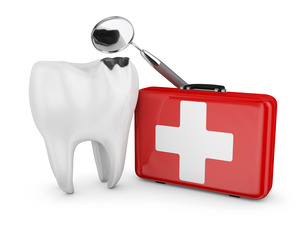
Dental emergencies are critical situations that require immediate attention from a dentist, including lost teeth, broken oral appliances, or crippling toothaches. They’re incredibly serious and can be scary to deal with, which is why it doesn’t help that they also seem to come up suddenly in many circumstances.
For that reason, it’s a good idea to be prepared for dental emergencies. Many dentists recommend building a dental emergency kit with everything you could need should one arise. Here are a few examples of what you should put in a kit like that.
What Can I Put in a Dental Emergency Kit?
Of course, your dental emergency kit can include as few or as many things as you’d like. Still, here are some things that it might be a good idea to include:
- Dental Mirror and Tweezers: Useful for inspecting and handling dental issues like dislodged crowns or stuck objects.
- Cotton Balls and Gauze Pads: Essential for stopping bleeding or providing padding for injured areas.
- Dental Wax: Can temporarily protect exposed areas from broken braces or sharp tooth edges.
- Temporary Filling Material: Useful for sealing cavities or securing a loose filling until you can see a dentist.
- Pain Relief: Include over-the-counter painkillers like ibuprofen, as well as clove oil or oral numbing gel for direct tooth pain relief.
- Saline Solution: Ideal for rinsing out your mouth or cleaning wounds.
- Cold Compress: To reduce swelling and numb pain after an injury.
- Oral Hygiene Essentials: Toothbrush, toothpaste, and floss are crucial for maintaining cleanliness in an emergency.
- Small Container with a Lid: For safely storing a knocked-out tooth or a dislodged crown until you can reach a dentist.
- Emergency Contact Information: Include your dentist’s contact details and the nearest emergency dental clinic.
How to Prevent Dental Emergencies
Of course, the easiest way to be prepared for a dental emergency is to do what you can to avoid them in the first place. The most important thing to do is to be thorough and consistent with your dental hygiene; brushing twice a day, flossing daily, and using antibacterial mouthwash. You should also see your dentist biannually for checkups and cleanings, which will allow them to detect oral health problems before they become especially serious.
About Our Practice
At LIC Dental Associates, we know that dental emergencies can be scary. That’s why we work not only to offer streamlined, affordable dental care—we also do what we can to make the process of getting exceptional dental care as comfortable as it can possibly be. When you’re in pain and you need someone in your corner, we’re happy to be here for you.
If you have any questions about dental emergencies, we can be reached at our website or by phone at (718) 530-6539.
